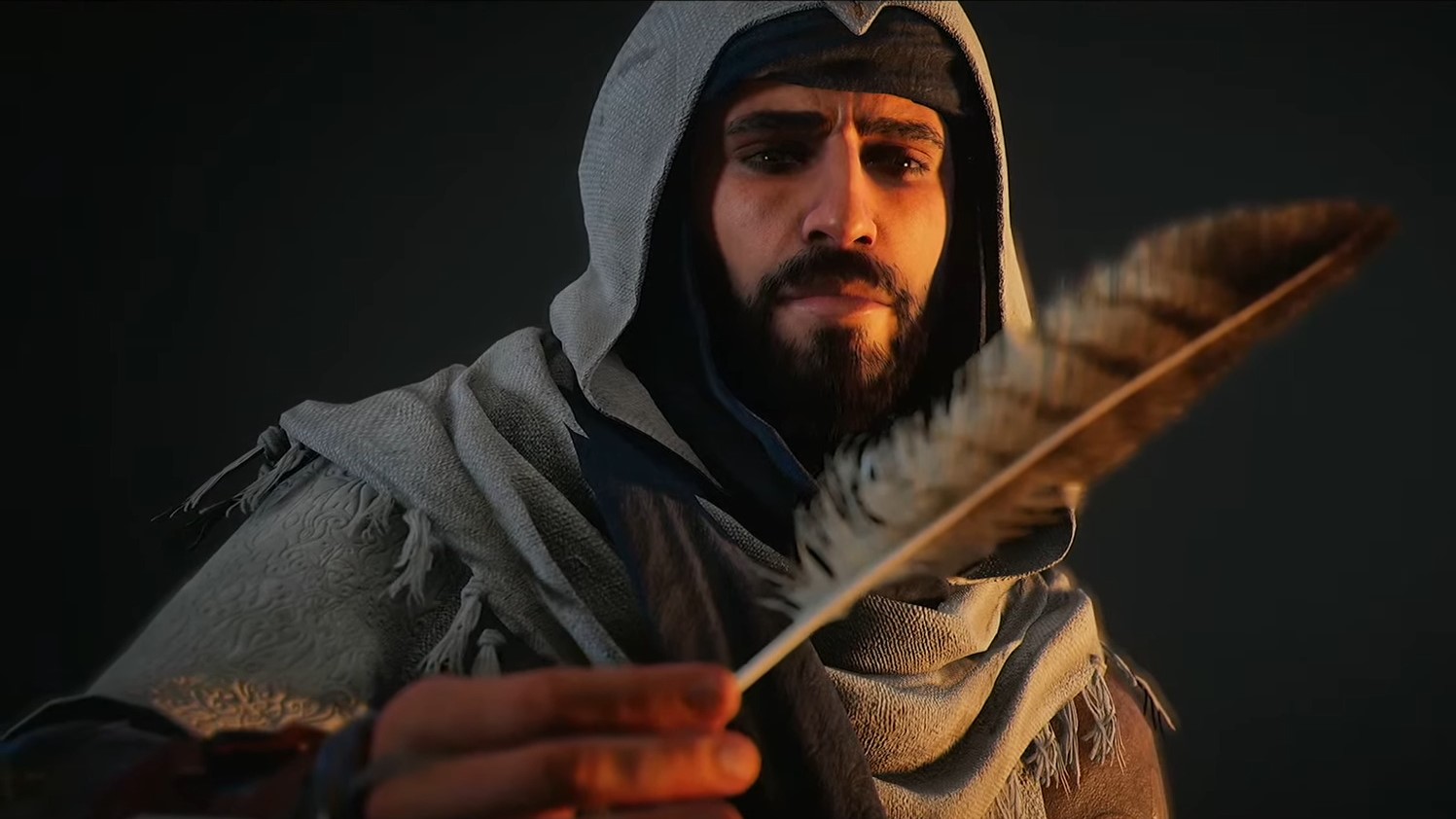
Sign up for breaking news, reviews, opinion, top tech deals, and more.
You are now subscribed
Your newsletter sign-up was successful
Assassin’s Creed Mirage’s stealth action is instantly gripping, satisfying, and a smooth mix of old elements with a modern sheen.
From well-timed pickpocketing, to luring a guard to isolation with a whistle, and from disappearing across the rooftops of Baghdad in a puff of smoke, to stalking a high-profile target, my time in a recent hands-on preview event indicated that the promised refocusing on stealth, parkour, and assassination has been fulfilled. ‘Back to its roots’ has been a common phrase applied to Mirage thus far; while that only looked to be true up until now, having now had time with the game, it feels true.
Playing parts of three different sections of the game, it didn’t take long to realize that Ubisoft Bordeaux’s attempts to bring Mirage back to Assassin’s Creed's history look to be heading in a very promising direction. I experienced Basim as an ambitious and aspiring street thief, a keen Hidden One in training, and a fully-fledged Assassin investigating and tracking down a target in bustling Baghdad, and while parts were familiar, each demonstrated the change in direction that Mirage represents.
Fluid and faster - but familiar
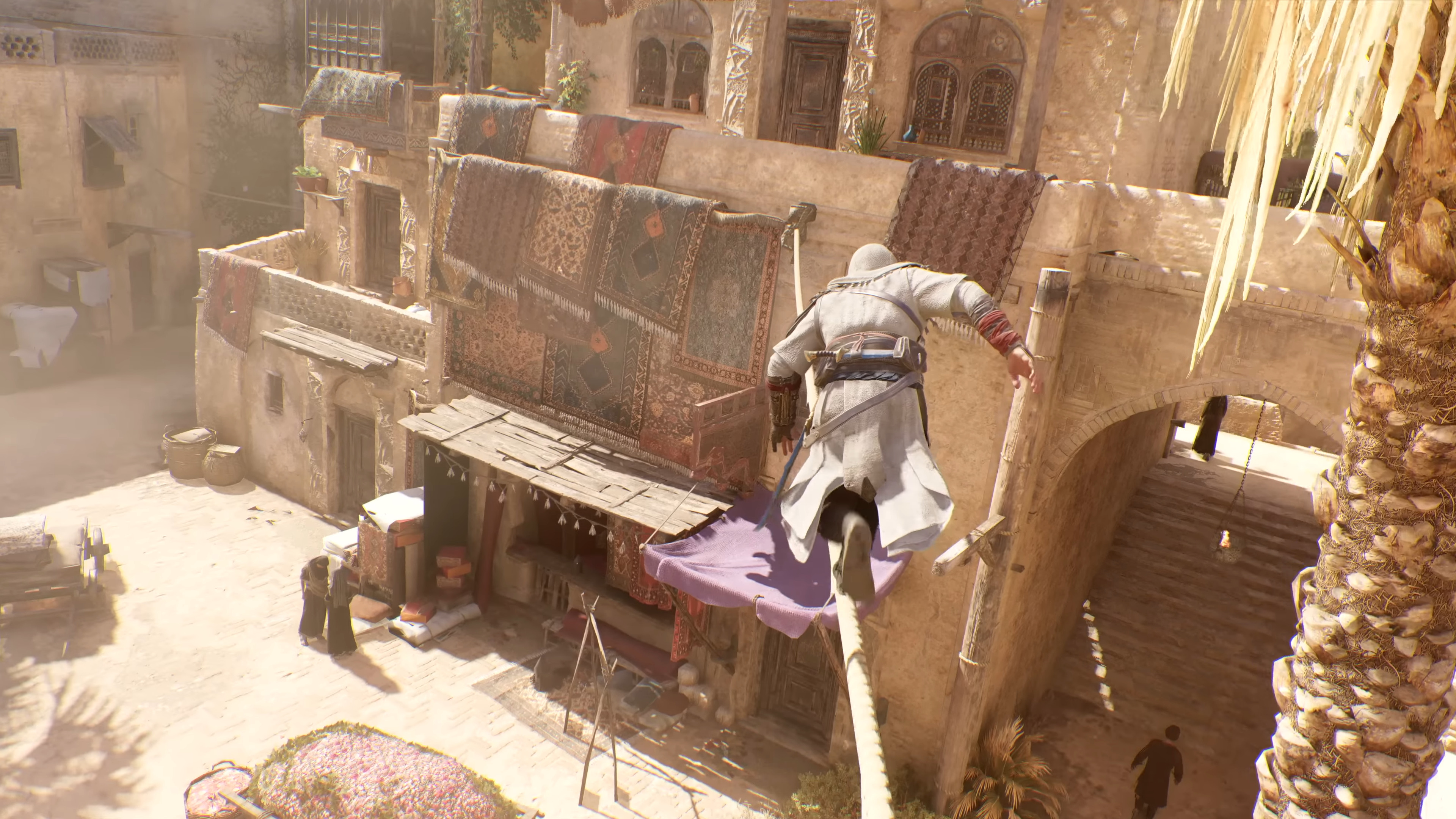
Basim the street thief is an accomplished pickpocketer and free runner, and the ambitious and aspiring bandit can nimbly fly across the rooftops of Baghdad and slip money pouches from merchants’ belts in a flash.
That first skill instantly made an impression and felt fluid and smooth, with Mirage’s Baghdad feeling as if it were made for parkour. The system and movement aren’t revolutionary (such as those introduced in Assassin’s Creed Unity) but it is far better deployed here than some previous games. It just feels much more liquid and immediate, with move after move being seamlessly knitted and linked together in satisfying and fast combos.
Throwing in new features such as poles to vault between buildings and across alleys is indicative of some of those new additions - but also indicative of the emphasis on the environment that has been designed to facilitate the parkour better. It’s almost like Baghdad’s architects knew the perfect jumping distances and climbing capabilities of the Hidden Ones in advance.
But Ninth-century Baghdad doesn’t just feel tailor-made for parkour - it’s also a tailor-made location for an Assassin’s Creed tale: Baghdad is one of the wealthiest, most powerful, and most important cities in the world at the time of Mirage. It’s a golden city with a rot of inequity and corruption beneath its veneer that needs to be cleansed.
Sign up for breaking news, reviews, opinion, top tech deals, and more.
Learning the moves
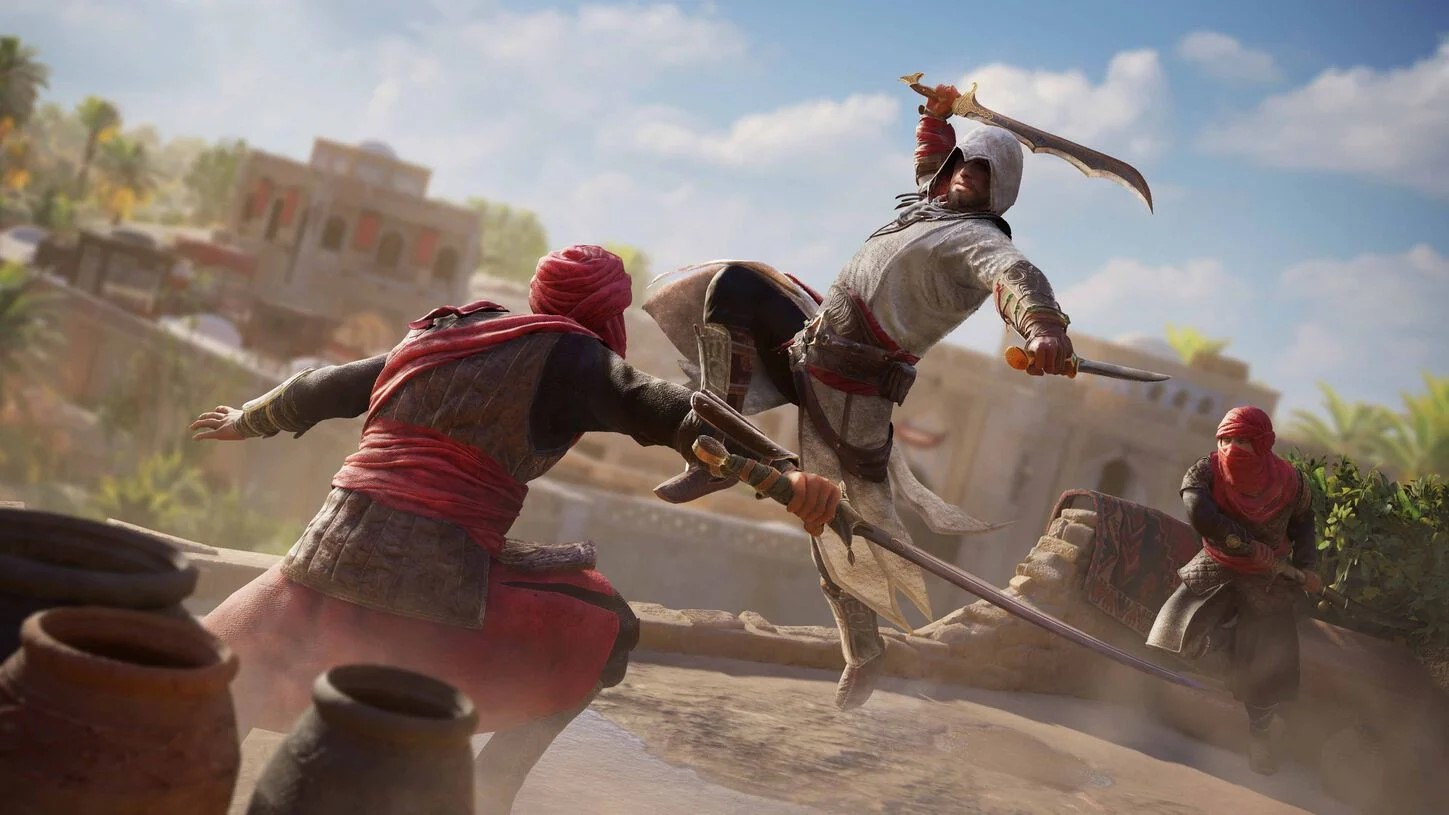
Fast forwarding a few years to a time during the construction of the Hidden One’s Alamut stronghold, I’m thrust into Basim’s steep learning curve as an ‘apprentice’ Hidden One.
His combat moveset and actions feel robust and agile - and, well, more Assassin-like. Definitely more akin to that of Altaïr or Ezio; while Basim can execute both light and heavy attacks, the sword and dagger combo I played with felt nimble, exciting, and flashy.
A stand out in the combat is how there’s much more of a greater emphasis on deflecting, parrying, and biding time to strike in combat in Mirage - rather than trying to rush or overwhelm enemies quickly. Team that with an effective dodge - crucial for enemies’ unparryable attacks - and, even in the practice training fight with Master Roshan, Basim feels at his best in combat when being patient, waiting for an enemy attack to parry, and striking quickly and efficiently.
Not only is parrying imperative for presenting potential opportunities to strike, but it’s also a means through which to regain stamina - something you’ll have to keep an eye on when attacking and defending. Patience and precision are the virtues here. After all, Basim himself can be staggered and hit by quick attacks too, so timing and caution are key.
Investigation, investigation, investigation
Putting Basim’s natural talent and training to the test, and traveling forward in time a few more years, I’m thrust into Baghdad once more. The job is to track and assassinate The Harbormaster, a shadowy figure that has their hand on the trade and commerce of Baghdad - naturally using their influence to tilt both in their favor.
However, you can only assassinate what you have investigated. This is something at the very core of Mirage’s missions, and there is a far, far greater emphasis on investigation, information gathering, and picture building, than simply performing a straight-up murder.
These investigations are substantial and multi-faceted; taking turns and twists throughout, with my journey taking me from conversations with old friends trying to trade, to entering a high-stakes auction, and from frantically trying to find information in a packed bazaar, to sneakily getting my hands on the required item to get me an audience with my target. Basim has to cast his net wide in order to find leads before he can hone in on information - there seems to be no concept of ‘immediate understanding’.
Yes, you’ll need to infiltrate guard outposts to find the clues, but you’ll also have to talk to merchants and find ways to get the right information out of them, eavesdrop on conversations, and utilize your eagle vision (one of a more traditional kind from the series) to help get you the information you need. There’s depth and layers to the investigations in Mirage which is incredibly exciting. Even the menu screen indicates a web of intrigue, mystery, and investigation that spread across Baghdad’s districts.
Peeling back the layers
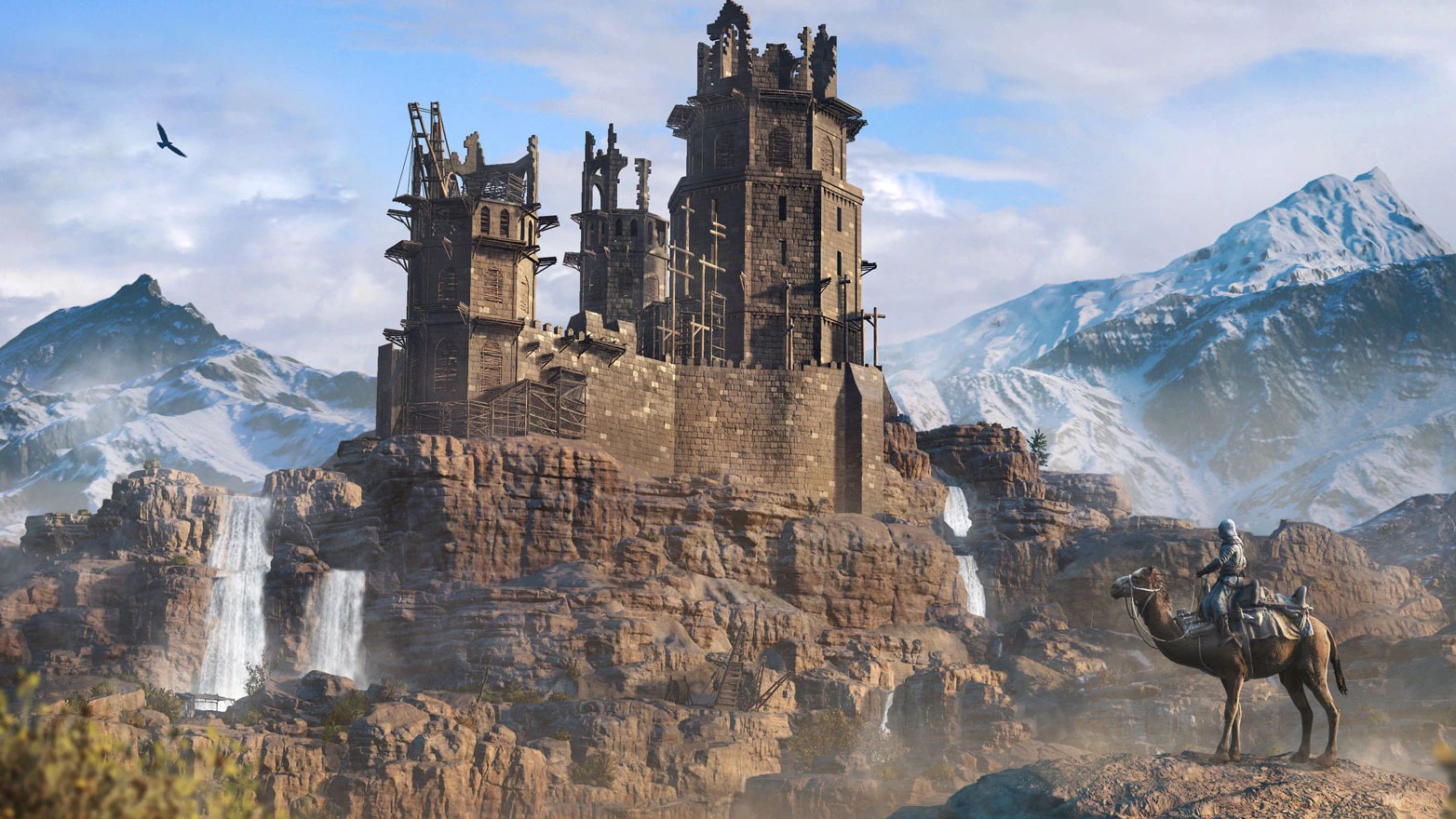
Such depth also applies to Basim’s options he has when carrying out investigations. Tagging enemies with your trusty Eastern Imperial eagle, Enkidu, utilizing the multiple ways into a restricted area, or using Basim’s small but honed assassin’s toolkit to cause distraction or disappear in a puff of smoke when things get too hot, all play major roles in the ways of the shadows he needs to use. Basim can’t take on everyone in open combat so needs to focus on guerrilla tactics, reconnaissance, and speed.
But inevitably you won’t be able to just keep in the shadows: visible actions lead to consequences and this is particularly the case when factoring in the returning notoriety system, itself more layered and nuanced than in previous Creed games. This can build very quickly indeed and features multiple levels of severity - even the ways to reduce it reflect Mirage’s depth to things. This stood out as a great example of a modern take on a core ‘Creed’ stealth feature, but also served to reinforce the focus on stealth not as merely an option in Mirage, but a necessity.
There’s no denying the older, traditional stealth-focused Assassin’s Creed-isms that have been injected into Mirage
Such layers extend to Baghdad itself, too. Taking a small detour at one point, I came across historic sites, points of interest, merchants of all stripes, town criers, restricted areas, new investigations, and quests, and I even stumbled across a familiar character from Assassin’s Creed Valhalla, too. Many elements of the game feel like a palimpsest, with each layer or element adding to a condensed and rich setting and journey.
Despite only being with Basim for a few hours, I am also intrigued by his layers, too. Seeing the character as several points of his journey has piqued my intrigue - from re-channeling that early ambition to struggling with shadowy nightmares, and from subtle words when taking out guards, to his embrace of the Hidden Ones’ philosophy there’s a journey here and hints at some character depth which I hope are realized.
New game, old tricks?
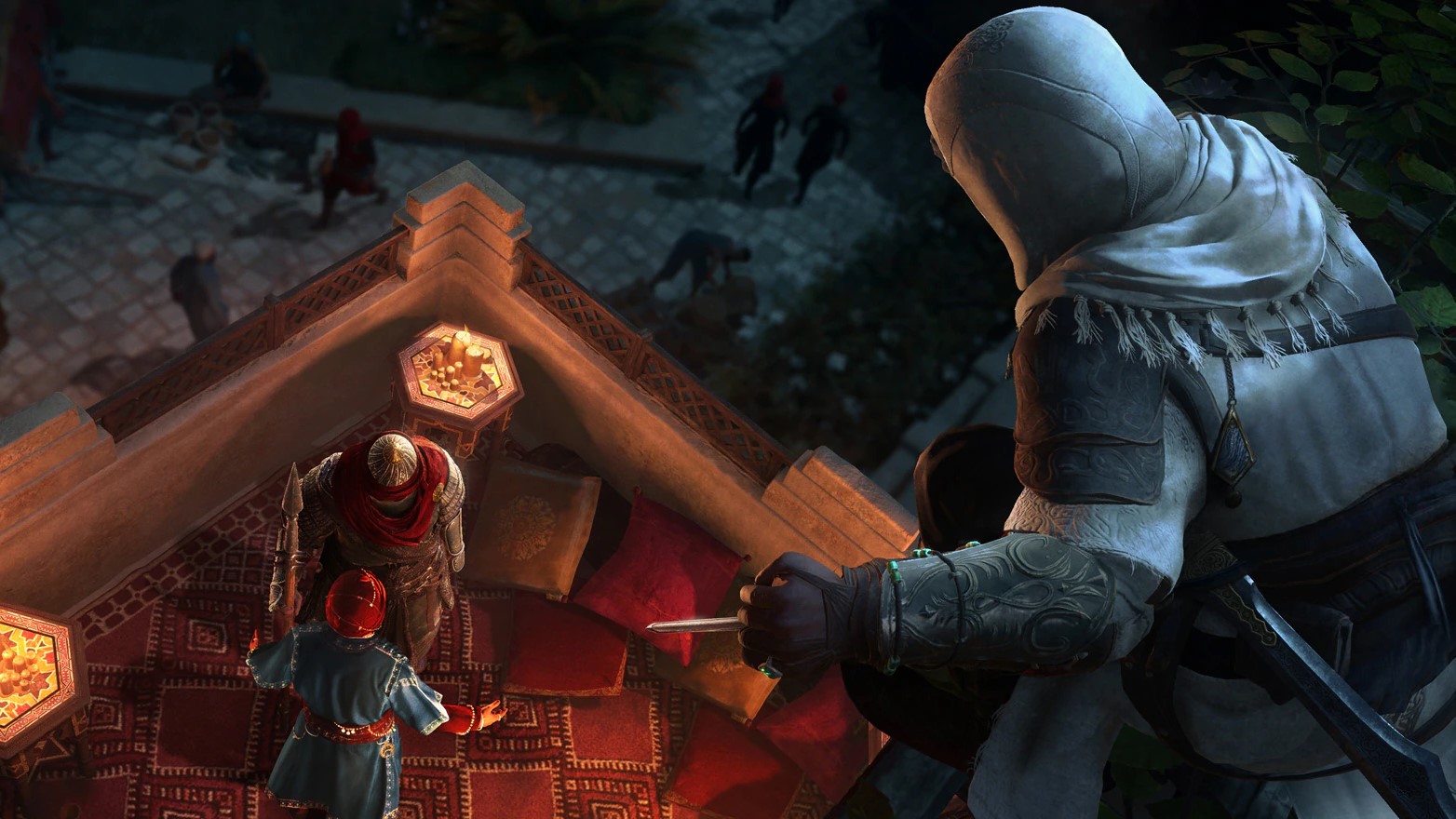
Is Assassin’s Creed Mirage the series’ “Michael-Jordan-’I’m-back’” moment? Possibly. But I have now had several moments that gave me that exact feeling - there really is a greater focus on parkour, stealth, and assassinations in Mirage’s DNA that comes straight from those brilliant games of Altaïr and Ezio. Throw in a modern perspective and take on elements from those games, and the result is like a new dog being taught old tricks.
It’s definitely cut from the same cloth as the recent RPG installments to the series - it feels and handles like a modern AC game - But there’s no denying the older, traditional stealth-focused Assassin’s Creed-isms that have been injected into Mirage. The results look to be something excellent; something that could well offer the best of both worlds or ‘eras’ of the series. It’s got its hooks into me, and I’m eager to peel back all its layers.
Swot up on the other entries in the series before Mirage with our ranking of the best Assassin’s Creed games.

Rob is the Managing Editor of TechRadar Gaming, a video games journalist, critic, editor, and writer, and has years of experience gained from multiple publications. Prior to being TechRadar Gaming's Managing Editor, he was TRG's Deputy Editor, and a longstanding member of GamesRadar+, being the Commissioning Editor for Hardware there for years, while also squeezing in a short stint as Gaming Editor at WePC just before joining TechRadar Gaming. He is also a writer on tech, gaming hardware, and video games but also gardens and landscapes, and has written about the virtual landscapes of games for years.